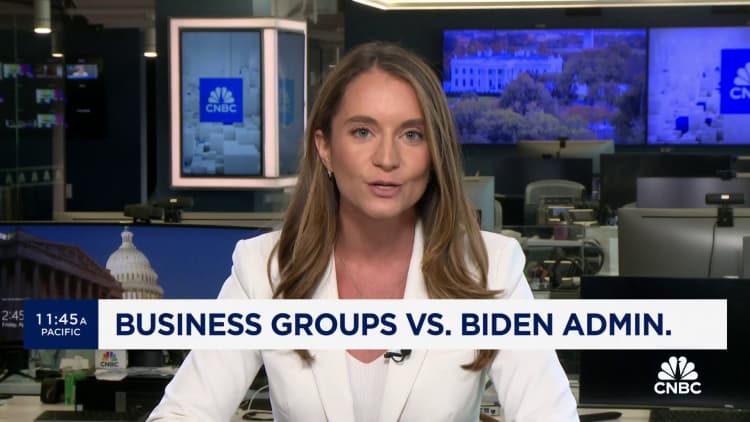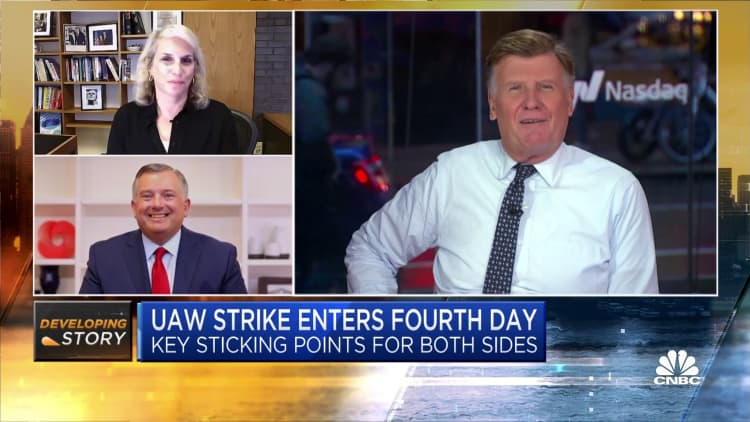Biden faces slew of lawsuits as business groups criticize overreach


WASHINGTON — When the Federal Trade Commission finalized a rule earlier this month banning non-compete clauses, the blowback was swift: Within 24 hours, the U.S. Chamber of Commerce led a handful of business groups to file a lawsuit seeking to block the ban. They argued that the FTC lacked the authority to impose it in the first place.
The playbook is becoming a familiar one: The Biden administration finalizes a new rule regulating business, and the Chamber and industry lobbying groups immediately sue to stop it by arguing that the agency has overstepped its authority.
So far this year, the administration has finalized seven rules, addressing everything from independent contractors to credit card late fees and climate disclosure requirements, only to see them met with near-immediate lawsuits by the Chamber and other groups.
In all, the Chamber expects to file at least 22 lawsuits against the Biden administration before the end of President Joe Biden’s current term, a dramatic increase from the three suits it filed against the Trump administration and the 15 it filed during Obama’s first term.
And they are not alone. The American Bankers Association, another influential lobbying group in Washington, has signed on to four lawsuits against banking regulators since Sept. 2022, after not signing on to any legal challenges to federal policy for roughly a decade before that.
Officials at both the Chamber and ABA emphasize that litigation is always a last resort. But they see it as a necessary step when agencies issue regulations that go outside the scope of their authority.
“It’s not just about a single regulation, right? It’s about the 1,000 regulations that are going to go final this year. It’s about the 200-plus regulations that have an economic impact of more than $200 million a year,” Neil Bradley, executive vice president at the Chamber, told CNBC in an interview.

“We went from a time when we would argue about a particular regulation,” Bradley said, “to a period where the concern is about the direction as a whole.”
Total private sector regulations have been increasing under Biden, according to one metric from George Mason University —especially compared to the Trump administration, during which they stayed more or less flat.
But Patrick McLaughlin, director of policy analytics at George Mason’s free-market, libertarian Mercatus Center think tank, who created the metric, says the nature of Biden’s regulations is more notable than the volume of them.
The Biden administration, in McLaughlin’s view, has been “expansive in their interpretation of authorizing statutes.”
“The Chamber and others see an opportunity to push back on regulations that, in their view, are going beyond what Congress authorized,” McLaughlin said.
The specific targets of the lawsuits have been varied: The Chamber has already sued a dozen agencies under the Biden administration, as compared to just four agencies under Obama. Despite the range of issues at play, the group’s arguments largely center on the claim that agencies are seeking to set rules in areas that can only be addressed by Congress.
Even before the FTC issued its ban on non-compete clauses, for example, the Chamber pledged to take FTC Chair Lina Khan to court over it, regardless of the specifics.
Federal Trade Commission Chair Lina Khan speaks during the New York Times annual DealBook summit in New York City, Nov. 29, 2023.
Michael M. Santiago | Getty Images
“She might come up with a policy that we would actually agree with on substance,” Bradley said of Khan before the final rule was released. “But the precedent of that authority is unacceptable.””
Regulation critics also argue that the Biden administration has not been appropriately following the rulemaking process, in part by failing to incorporate viewpoints from stakeholders as part of the final regulation.
“When they insist on finalizing rules that fall outside their regulatory purview, and when they ignore constructive feedback from banks and other stakeholders, litigation is the only remaining tool in our toolbox,” ABA President and CEO Rob Nichols said earlier this year. “It’s not a tool we want to use, but it’s one we will continue to strategically wield as needed.”
The Biden administration says the focus with all of its regulations is on protecting consumers and saving them money. Their estimates show that the FTC’s non-compete ban will boost wages by at least $400 billion over the next decade.
The administration also estimates that the Consumer Financial Protection Bureau’s move to slash credit card late fees will save 45 million Americans $220 per year, and the Environmental Protection Agency’s air-quality rule will yield up to $46 billion in net health benefits in 2032.
“We are fully confident these agencies are acting within their authorities,” said White House Assistant Press Secretary Michael Kikukawa, in a statement to CNBC. “These rules help American workers and families by increasing wages, lowering costs, saving lives, and building a fairer economy.”
But there can be a cost to complying with regulation, too—especially when each new administration can rewrite the rules of the road.
“If you make an investment in one thing, are you going to find out that there’s some obscure regulation that you were unaware of, that would suddenly decrease the value of that investment?” asked McLaughlin, of the Mercatus Center. “Or make you stop being able to produce it altogether?”







